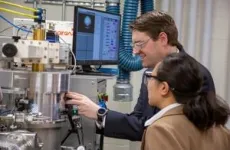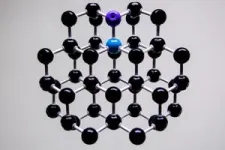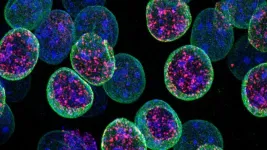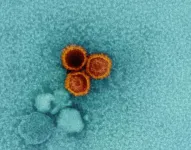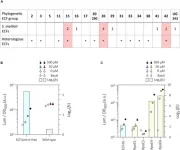(Press-News.org) Consortium led by the University is to receive almost £11 million to open doctoral training centre
Will focus on use of biomass to replace fossil fuels and removal of CO2
“…part of the UK’s biggest-ever investment in engineering and physical sciences doctoral skills”.
Aston University is to train the next generation of scientists tasked to remove greenhouse gases from the environment.
A consortium led by the University is to receive almost £11 million to open a doctoral training centre which will focus on leading the UK towards net zero.
The centre, based at Aston University, will bring together world-leading research expertise and facilities from the University of Nottingham, Queens University Belfast and the University of Warwick and more than 25 industrial partners
The funding has been announced by the UK science, innovation and technology secretary Michelle Donelan. The centre is to receive almost £8 million of government money while the remainder will be made up through match funding and support from industry and the four universities. The government has described it as part of the UK’s biggest-ever investment in engineering and physical sciences doctoral skills, totalling more than £1 billion.
The Aston University centre will focus on the use of biomass to replace fossil fuels and removal (or capture) of CO2 from the atmosphere, with the potential to create new sources of fuels and chemicals. Integration of these two areas will lead to significant cost and energy savings.
Called NET2Zero, the centre will train PhD students across the full range of engineered greenhouse gas removal techniques including direct air capture, CO2 utilisation (including chemical and material synthesis), biomass to energy with carbon capture and storage, and biochar.
The students will work in the centre’s laboratories exploring the conversion of feedstock into alternative energy, improving conversion processes and measuring how the new technologies will impact the economy.
Supported by a range of relevant industrial, academic and policy partners the centre will equip students to develop the broad range of skills essential for future leaders in decarbonisation.
NET2Zero will be led by Professor Patricia Thornley, director of Aston University’s Energy and Bioproducts Research Institute (EBRI).
She said: “I am delighted that this centre for doctoral training has been funded. The climate emergency is so stark that we can no longer rely on demand reduction and renewables to meet our decarbonisation targets.
“If we are to have greenhouse gas removal options ready in time to be usefully deployed, we need to start now to expand our knowledge and explore the reality of how these can be deployed. This partnership of four leading UK universities with key industrial and policy partners will significantly augment the UK’s ability to deliver on its climate ambitions.”
“We are absolutely delighted to be working with our partners to deliver this unique and exciting programme to train the technology leaders of the future. Our students will deliver research outcomes that are urgently needed and only made possible by combining the expertise and resources of all the centre’s academic and industry partners.”
Science and technology secretary, Michelle Donelan, said: “As innovators across the world break new ground faster than ever, it is vital that government, business and academia invests in ambitious UK talent, giving them the tools to pioneer new discoveries that benefit all our lives while creating new jobs and growing the economy.
“By targeting critical technologies including artificial intelligence and future telecoms, we are supporting world class universities across the UK to build the skills base we need to unleash the potential of future tech and maintain our country’s reputation as a hub of cutting-edge research and development.”
Centres for doctoral training have a significant reputation in training future UK academics, industrialists and innovators who have gone on to develop the latest technologies.
The University of Nottingham’s Dr Eleanor Binner said: “We are absolutely delighted to be working with our partners to deliver this unique and exciting programme to train the technology leaders of the future. Our students will deliver research outcomes that are urgently needed and only made possible by combining the expertise and resources of all the Centre’s academic and industry partners.”
Her colleague Professor Hao Liu added: “We look forward to providing our best support to the NET2Zero CDT, including using our past and existing successful experience in leading other centres, to make this an exemplar.”
Overall, there will be 65 new Engineering and Physical Sciences Research Council (EPSRC) centres for doctoral training which will support leading research in areas of national importance including the critical technologies AI, quantum technologies, semiconductors, telecoms and engineering biology. The funding is from a combination of £500 million from UK Research and Innovation and the Ministry of Defence, plus a further £590 million from universities and business partners
END
Aston University to train the UK’s next generation of decarbonization experts
Aston University is to train the next generation of scientists tasked to remove greenhouse gases from the environment
2024-03-12
ELSE PRESS RELEASES FROM THIS DATE:
Gene flow in giraffes and what it means for their conservation
2024-03-12
Giraffes are a beautiful and powerful example of what adaptive evolution can achieve. However, in recent years they have attained notoriety for a completely different reason: it has been suggested that instead of one giraffe species, there might be no fewer than four different species. Such dramatic taxonomic reappraisals in highly conspicuous and well-known “flagship” taxa are very unusual. The suggestion caused some uproar in the scientific community and received a lot of media attention. Much is at stake, because the way that most nature conservation works is focused on species, meaning that each species must receive its own dedicated conservation action plan and must ...
Study reveals the role of the protein Kdm1a in maintaining neuronal identity
2024-03-12
Epigenetic processes allow different cell types to emerge from a single genome. Throughout development, cells differentiate and acquire distinct characteristics by expressing the same genome in different ways. However, a less-known aspect of this process is how cells maintain their unique identities over time. A study led by the Transcriptional and Epigenetic Mechanisms of Neuronal Plasticity laboratory, headed by Angel Barco at the Institute for Neurosciences, a joint center of the Spanish National Research Council (CSIC) and the Miguel Hernández University (UMH) of Elche, has determined that the protein Kdm1a plays ...
UT Arlington grad student earns fellowship from atomic energy agency
2024-03-12
The International Atomic Energy Agency (IAEA) has awarded a prestigious fellowship aimed at encouraging women to study nuclear-related subjects to a University of Texas at Arlington graduate student researching isotope hydrology.
Suprina Shrestha, a master’s student in earth and environmental sciences, received a Marie Sklodowska-Curie Fellowship (MSCF) from the IAEA. She studies tracer hydrology, which is the use of natural and artificial tracers to examine hydrological processes, under the mentorship of Ricardo Sanchez-Murillo, associate professor of ...
More than flying cars
2024-03-12
Researchers at the Department of Energy’s Oak Ridge National Laboratory are taking cleaner transportation to the skies by creating and evaluating new batteries for airborne electric vehicles that take off and land vertically.
These aircraft, commonly called eVTOLs, range from delivery drones to urban air taxis. They are designed to rise into the air like a helicopter and fly using wing-borne lift like an airplane. Compared with helicopters, eVTOLs generally use more rotors spinning at a lower speed, making them both safer and quieter.
The ...
Centre for Doctoral Training in Diversity in Data Visualization awarded over £9m funding from the EPSRC
2024-03-12
Announced today, a new Centre for Doctoral Training (CDT) has been funded by a grant of over £9 million from the Engineering and Physical Sciences Research Council (EPSRC) to help train the next, diverse generation of research leaders in data visualization.
A collaboration between City, University of London and the University of Warwick, the EPSRC Centre for Doctoral Training in Diversity in Data Visualization (DIVERSE CDT) will train 60 PhD students, in cohorts of 12 students, beginning in October 2025. The set-up phase will begin in July 2024.
The funding announcement is part of a wider UK Research & Innovation (UKRI) announcement of ...
NIH scientists find weak points on Epstein-Barr virus
2024-03-12
WHAT:
Studies of interactions between two lab-generated monoclonal antibodies (mAbs) and an essential Epstein-Barr virus (EBV) protein have uncovered targets that could be exploited in designing treatments and vaccines for this extremely common virus. The research was led by Jeffrey I. Cohen, M.D., and colleagues from the National Institute of Allergy and Infectious Diseases (NIAID), part of the National Institutes of Health. Study findings were published in the journal Immunity.
Approximately 95% of the world’s population is infected with EBV, which remains in the body permanently, typically ...
Spiral wrappers switch nanotubes from conductors to semiconductors and back
2024-03-12
DURHAM, N.C. -- It might look like a roll of chicken wire, but this tiny cylinder of carbon atoms -- too small to see with the naked eye -- could one day be used for making electronic devices ranging from night vision goggles and motion detectors to more efficient solar cells, thanks to techniques developed by researchers at Duke University.
First discovered in the early 1990s, carbon nanotubes are made from single sheets of carbon atoms rolled up like a straw.
Carbon isn’t exactly a newfangled material. All life on Earth is based on carbon. ...
Researchers identify distinct sleep types and their impact on long-term health
2024-03-12
UNIVERSITY PARK, Pa. — Poor sleep habits are strongly associated with long-term chronic health conditions, according to decades of research. To better understand this relationship, a team led by researchers in Penn State’s College of Health and Human Development identified four distinct patterns that characterize how most people sleep. These patterns are also predictive of long-term health, the researchers said.
Soomi Lee, associate professor of human development and family studies at Penn State, ...
City of Hope to present new research at the American Association of Cancer Research (AACR) Annual Meeting 2024, highlighting promising data on prostate, colorectal and pancreatic cancer
2024-03-12
This year, City of Hope doctors and scientists will also present data during AACR’s Press Program and a clinical trials plenary session:
Monday, April 8, 2024, at 8:30 a.m.
Research by Ajay Goel, Ph.D., M.S., City of Hope professor and chair, Department of Molecular Diagnostics and Experimental Therapeutics, and Caiming Xu, Ph.D., a postdoctoral fellow in Goel’s lab, will be presented at an AACR press conference. The abstract is titled “An exosome-based liquid biopsy for non-invasive, early detection of patients with pancreatic ductal adenocarcinoma: A multicenter ...
Exploring the transferability of extracytoplasmic function switches across bacterial species
2024-03-12
Extracytoplasmic function sigma factors (ECFs) have been successfully used for constructing predictable artificial gene circuits bacteria like Escherichia coli, but their transferability between species within the same phylum remained unknown. Now, a recent study by a group of researchers from Germany and Australia explored the bacteria Sinorhizobium meliloti and identified ECF switches with cross-species functionality, constructed genetic circuits, and provided a toolbox for universal synthetic biology applications.
In the field of synthetic biology, creating artificial gene circuits with predictable outcomes is both a challenge and a necessity. Extracytoplasmic function sigma factors ...
LAST 30 PRESS RELEASES:
ASU researchers showcase scalable tech solutions for older adults living alone with cognitive decline at AAAS 2026
Scientists identify smooth regional trends in fruit fly survival strategies
Antipathy toward snakes? Your parents likely talked you into that at an early age
Sylvester Cancer Tip Sheet for Feb. 2026
Online exposure to medical misinformation concentrated among older adults
Telehealth improves access to genetic services for adult survivors of childhood cancers
Outdated mortality benchmarks risk missing early signs of famine and delay recognizing mass starvation
Newly discovered bacterium converts carbon dioxide into chemicals using electricity
Flipping and reversing mini-proteins could improve disease treatment
Scientists reveal major hidden source of atmospheric nitrogen pollution in fragile lake basin
Biochar emerges as a powerful tool for soil carbon neutrality and climate mitigation
Tiny cell messengers show big promise for safer protein and gene delivery
AMS releases statement regarding the decision to rescind EPA’s 2009 Endangerment Finding
Parents’ alcohol and drug use influences their children’s consumption, research shows
Modular assembly of chiral nitrogen-bridged rings achieved by palladium-catalyzed diastereoselective and enantioselective cascade cyclization reactions
Promoting civic engagement
AMS Science Preview: Hurricane slowdown, school snow days
Deforestation in the Amazon raises the surface temperature by 3 °C during the dry season
Model more accurately maps the impact of frost on corn crops
How did humans develop sharp vision? Lab-grown retinas show likely answer
Sour grapes? Taste, experience of sour foods depends on individual consumer
At AAAS, professor Krystal Tsosie argues the future of science must be Indigenous-led
From the lab to the living room: Decoding Parkinson’s patients movements in the real world
Research advances in porous materials, as highlighted in the 2025 Nobel Prize in Chemistry
Sally C. Morton, executive vice president of ASU Knowledge Enterprise, presents a bold and practical framework for moving research from discovery to real-world impact
Biochemical parameters in patients with diabetic nephropathy versus individuals with diabetes alone, non-diabetic nephropathy, and healthy controls
Muscular strength and mortality in women ages 63 to 99
Adolescent and young adult requests for medication abortion through online telemedicine
Researchers want a better whiff of plant-based proteins
Pioneering a new generation of lithium battery cathode materials
[Press-News.org] Aston University to train the UK’s next generation of decarbonization expertsAston University is to train the next generation of scientists tasked to remove greenhouse gases from the environment

